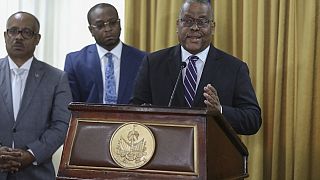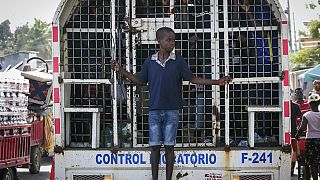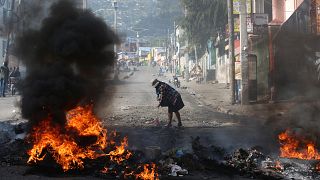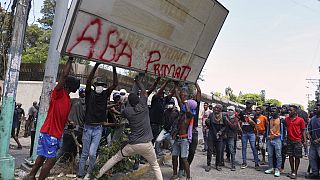Haiti
Haiti’s main international airport reopened Monday for the first time in nearly three months after relentless gang violence forced authorities to close it to all traffic in early March.
The reopening of the Toussaint-Louverture airport in the capital of Port-au-Prince is expected to help ease a critical shortage of medications and other basic supplies since the country’s main seaport remains paralyzed.
However, only Sunrise Airways, a local carrier, is flying in and out of Port-au-Prince for now. US-based airlines are not expected to start doing so until late May or early June.
The first flight expected was one from Sunrise Airways bound for Miami and scheduled to depart at 2:30 pm EDT.
Before Monday’s reopening, the sole airport operating in Haiti was the one located in the north coastal city of Cap-Haitien. However, it was out of reach for many seeking to flee the country since the roads leading from Port-au-Prince to Cap-Haitien are controlled by gangs that have opened fire on cars and buses passing through.
As a result, the U.S. government evacuated hundreds of its citizens by helicopter out of a hilly neighborhood in Port-au-Prince, as did nonprofit organizations, as powerful gangs laid siege to parts of the capital.
The attacks began on Feb. 29, with gunmen seizing control of police stations, opening fire on the Port-au-Prince airport and storming Haiti’s two biggest prisons, freeing more than 4,000 inmates.
Gangs since then have directed their attacks on previously peaceful communities, leaving thousands homeless.
More than 2,500 people have been killed or injured in Haiti from January to March, a more than 50% increase compared to the same period last year, according to the United Nations.
At the Couronne Bar near the sole gate that was operating on Monday, 43-year-old manager Klav-Dja Raphael welcomed her first clients, ensuring quick service for the coffee, water and occasional Prestige beer they ordered.
But her smile belied her fear. “We are scared because they can still attack us here,” she said. “We must come in. It’s our job, but we’re afraid.”
Raphael recalled how bullets ricocheted through the airport the day it was attacked, forcing them to close for nearly three months.
While the airport provided them a month’s worth of wages, she was left unemployed for the rest of the time, relying on friends and family. She is anxious to join her 13-year-old son who lives in Florida with his father.
Other workers, including those at immigration, were all smiles, content to be finally back at work.
“That was a long vacation!” exclaimed one immigration agent as she grinned.
Dozens of people had lined up at the Sunrise Airways counter hours before the afternoon flight, some taking selfies, others chatting contently.
“I’m very happy, but it hurts that I’m leaving my husband and my son,” said Darling Antoine as her eyes began to water.
She received a visa allowing her to live in the U.S., but the rest of her family is still waiting. They applied because gangs kept encroaching on their neighborhood. “There are heavy gunshots every day,” she said. “Sometimes, we have to hide under the bed.”
A man, dressed in all black except for a red jacket, asked if Antoine could take a picture of him as he posed with a slight smile on his face and a gold cross around his neck.
“I’m really happy,” said Jean Doovenskey, a 31-year-old accountant, left unemployed by the violence. “We’ve suffered for a long time. We didn’t have the privilege of flying.”
He was notified in early April that he was authorized to live in the U.S., but all he could do was wait. He will live with his aunt in Jacksonville, Florida, but he hopes to return to Haiti one day and live. “I believe in a new Haiti,” he said.
The attack on the airport left former Prime Minister Ariel Henry locked out of Haiti since he was on an official trip to Kenya at the time. He has since resigned, and a transitional presidential council is seeking a new prime minister for Haiti. It is also tasked with selecting a new Cabinet and organizing general elections.
In recent weeks, U.S. military planes have landed at the Port-au-Prince airport with supplies, including medication and hydration fluids as well as civilian contractors to help Haiti prepare for the arrival of foreign forces expected to help quell violence unleashed by gangs that control 80% of the capital.
On Sunday, Korir Sing’oei, Kenya’s foreign affairs principal secretary, said a plan to deploy police officers from the East African country was in its final stages.
“I can tell you for sure that that deployment will happen in the next few days, few weeks,” he said.
Sing’oei added that “there is no chance at all” Kenyan President William Ruto will visit Haiti.
Ruto was scheduled to depart Kenya on Sunday for an official four-day visit to the U.S., where he is expected to meet President Joe Biden.
In March, Kenya and Haiti signed agreements to try to salvage a plan for the African country to deploy 1,000 police officers to the troubled Caribbean nation to help the violence.
Other countries expected to back up the Kenyan forces include the Bahamas, Barbados, Benin, Chad and Bangladesh. It wasn’t immediately clear when those forces would arrive.












01:06
UN warns of deepening Haiti crisis
Go to video
Protesters in Haiti demand protection against gangs
Go to video
Pics of the day: March 26, 2025
01:10
Plane lands at Heathrow as airport resumes limited operations following fire
01:01
Heathrow fire disrupts flights
Go to video
Pics of the day: March 20, 2025